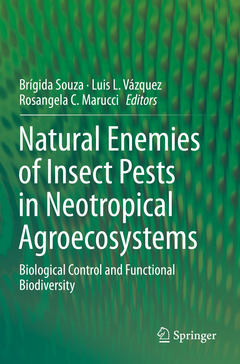Description
Natural Enemies of Insect Pests in Neotropical Agroecosystems, 1st ed. 2019
Biological Control and Functional Biodiversity
Coordinators: Souza Brígida, Vázquez Luis L., Marucci Rosangela C.
Language: English
Subject for Natural Enemies of Insect Pests in Neotropical...:
Publication date: 01-2021
546 p. · 15.5x23.5 cm · Broché
Publication date: 12-2019
546 p. · 15.5x23.5 cm · Relié
Résumé
/li>Sommaire
/li>Biographie
/li>Commentaire
/li>
This book aims to address the importance of natural enemies and functional diversity for biological control in Neotropical agroecosystems. Several aspects related to the conservation of natural enemies, such as vegetation design and climate change, are discussed in Part 1 and the bioecology of several insects groups used in biological control in Latin America is presented in Part 2. Part 3 is devoted to mass production of natural enemies while Part 4 describes how these insects have been used to control of pests in major crops, forests, pasture, weeds and plant diseases. Lastly, Part 5 reports Latin-American experiences of integration of biological in pest management programs.
Part 1. Conservation of natural enemies and functional biodiversity in Neotropical agroecosystems.- 1. Vegetational design to enhance biological control of insect pests in agroecosystems.- 2. Interactions of natural enemies with non-cultivated plants.- 3. Quality of agroecosystems as habitats to natural enemies and biological control agents.- 4. Plants as food for adult natural enemies.- 5. Dispersion and increase of natural enemies in agroecosystems.- 6. Climate change and biological control of pests in agriculture.- Part 2. Bioecology of natural enemies used in biological control in the Neotropical region.- 7. Predator insects.- 8. Predator mites.- 9. Parasitoid insects.- 10. Entomopathogenic nematodes.- 11. Entomopathogenic fungi.- 12. Entomopathogenic virus.- 13. Bacillus thuringiensis.- 14. Interactions of entomopathogenic fungus with entomophagous insects in agroecosystems.- Part 3. Mass production of biocontrol agents in Latin America: rearing techniques and releasing strategies.- 15. Predators insects.- 16. Predatory mites for the biological control of phytophagous mites.- 17. Parasitoid insects.- 18. Entomopathogenic nematodes.- 19. Entomopathogenic fungi.- 20. Entomopathogenic virus.- 21. Bacillus thuringiensis.- Part 4. Biological control in major crops, forests, pasture, weeds and plant diseases in the Neotropical region.- 22. Bean.- 23. Coffee.- 24. Cotton.- 25. Forests .- 26. Fruit crops.- 27. Maize.- 28. Oleraceous.- 29. Ornamental plants.- 30. Pasture.- 31. Rice.- 32. Soybean.- 33. Sugarcane.- 34. Microbial control of sugarcane pests.- 35. Weeds.- 36. Plant diseases.- 37. Physiological and ecological selectivity of pesticides for natural enemies of insects.- 38. Use of natural chemical products for pest control.- 39. Effects of transgenic plants over natural enemies.- 40. Use of silicon as resistance factor for plants against insect pests. Use of semiochemical-based strategies to enhance biological control.- 41. Use of semiochemical-based strategies to enhance biological control.- 42. Aphid-tending ants and their effects on natural enemies used in the biological control.- Index.
Brígida Souza has a PhD in Entomology from the Federal University of Lavras (UFLA) where she is a professor since 1997. As a researcher, she is focused on biological control of insect pest and published more than 130 peer-reviewed articles, 2 books and 5 book chapters. She supervises master and PhD students and was the coordinator of Graduate Program at UFLA from 2012 to 2016.
Luis L Vázquez has a PhD in Agriculture Sciences from Central University of Las Villas (1969), Cuba and founded the Instituto de Investigaciones de Sanidad Vegetal (INISAV) in 1977, where he worked until retirement in 2004. His research work involved the taxonomy of insect group pests (Aleyrodidae and Scolytinae), conservational biological control, agroecological pest management and functional biodiversity in production systems. He published more than 120 articles in peer-reviewed journals and technical magazines and more than 15 books and chapters.
Rosangela Cristina Marucci has a PhD in Entomology from the University of São Paulo (2003). Prior to joining UFLA in 2015, She worked as consultant and lecturer for private companies and agriculture schools. At UFLA her research focus in on biological control pests with entomophagous insects. She published 20 peer reviewed articles and supervises master and PhD students.
Ces ouvrages sont susceptibles de vous intéresser

Predators and Parasitoids 71,13 €

Beneficial Insects 196,56 €


